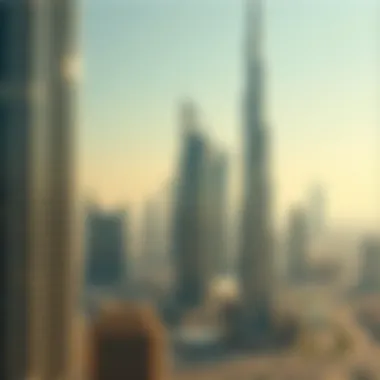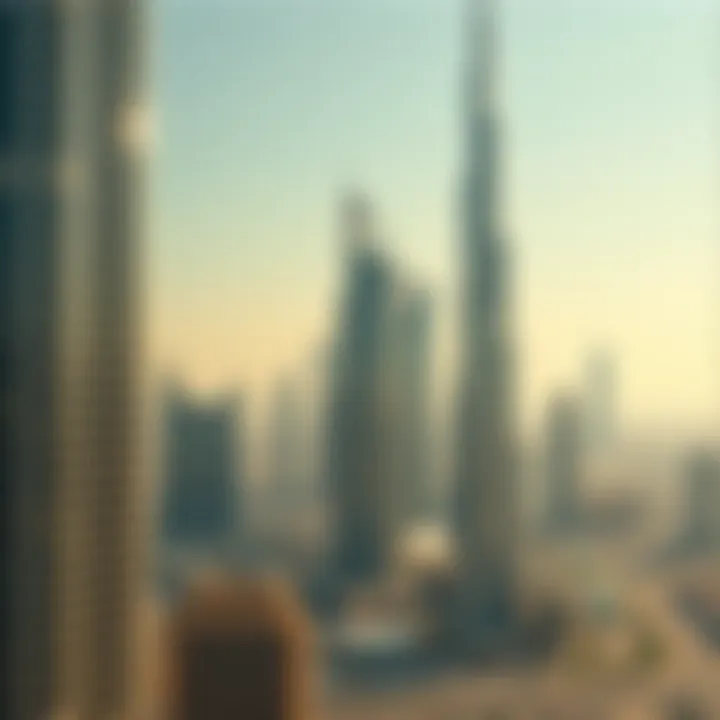Navigating Dubai's Commercial Real Estate Market


Intro
In recent years, Dubai has carved out its niche as a global hub for commerce and innovation. The commercial real estate sector here presents a unique conundrum; it's thriving yet complex. Investors, real estate agents, and analysts will find ample opportunities as well as challenges in this bustling marketplace. Yet the intricacies that govern this landscape are anything but straightforward. From skyscrapers that term into the skyline to sprawling office parks on the outskirts, the city's commercial properties tell a story of ambition and rapid growth.
As we venture into the depths of Dubai's commercial real estate market, we'll explore the key market trends influencing decisions, discuss smart investment strategies, and highlight the regulatory frameworks that play a pivotal role. By understanding these nuances, our primary audience— investors, agents, homeowners, and analysts— will be equipped to navigate this evolving arena with a much clearer sense of direction.
Each section is poised to unravel vital insights that not only inform but also inspire thoughtful action. Whether you're keen on setting up a business, investing in property, or simply curious about the sector's dynamics, this article strives to be your compass in the commercial real estate maze of Dubai.
Preface to Commercial Real Estate in Dubai
The world of commercial real estate in Dubai is nothing short of fascinating. With its glittering skyline and burgeoning economy, Dubai serves as a beacon for investors and real estate professionals alike. Commercial real estate, which includes assets like office buildings, retail spaces, and hotels, plays a pivotal role in the urban fabric of this dynamic city. In this section, we will dissect the concept of commercial real estate and its significance in Dubai, clarifying why it should matter to those interested in entering this market.
Defining Commercial Real Estate
Commercial real estate often conjures images of towering spires and bustling shopping malls. But it’s more than just physical structures. It is about spaces that facilitate economic activity. Legally, commercial real estate is classified as property used for business purposes. This can include:
- Office spaces: Buildings or sections of buildings designed for businesses to conduct their operations.
- Retail locations: Stores and shopping centers where goods and services are sold to consumers.
- Industrial units: Warehouses, factories, and distribution centers critical for manufacturing and logistics.
- Hospitality venues: Hotels, motels, and resorts that welcome guests from around the globe.
In Dubai, commercial real estate also signifies an ever-evolving landscape where innovation meets tradition. As the city continues to grow, so does the need for flexible spaces catering to various industries—tech hubs, co-working spaces, and luxury retail environments are all part of this diverse spectrum.
Importance of the Sector in Dubai’s Economy
The commercial real estate sector contributes significantly to Dubai’s economy, acting as one of its key pillars. According to various studies, up to 30 percent of Dubai's GDP may come directly or indirectly from this sector. The growth of commercial real estate is not merely about building properties; it’s also about fostering economic activity, job creation, and tourism.
Key Reasons Why This Sector Matters:
- Employment Opportunities: Commercial properties house countless businesses, creating jobs for a wide array of skill sets. This employment momentum supports the local community.
- Tourism Revenue: Hospitality properties attract millions of visitors, generating bundles of revenue for the tourism sector.
- Foreign Investment: The allure of Dubai’s commercial property has drawn international investors, injecting foreign capital that fuels further development.
- Innovative Economic Hub: Dubai aims to be a global business hub with initiatives such as Dubai Expo and Vision 2021, which prioritize real estate development as a key driver for investment and growth.
In summary, understanding commercial real estate in Dubai is essential. It's not just about profit margins and property yields; it’s fundamentally connected to the pulse of the city’s economy. Investors and stakeholders must navigate this intricate landscape with a clear perspective on why their role in it is crucial.
Current Market Trends
Understanding the current market trends in Dubai's commercial real estate sector is crucial for investors and stakeholders aiming to navigate the complexities of this vibrant landscape. Recognizing shifts and patterns in the market allows for informed decisions that can lead to lucrative opportunities.
Growth Patterns Over the Recent Years
Over the last few years, Dubai's commercial real estate has experienced notable transformations. The growth can be traced back to several key factors, including economic reforms, infrastructure development, and the diversification of the economy. The introduction of the 10-year Golden Visa in 2019 made it a prime time for long-term investments, where foreigners can secure residency and, in turn, invest in commercial properties. The lifting of certain international travel restrictions post-pandemic has also injected fresh energy into the market.
Further, the surge in population driven by an influx of expatriates has led to increased demand for various types of commercial properties. As a result, we've seen a steady uptick in property prices and rental rates in strategic areas, pairing economic growth with robust real estate demand. This symbiotic relationship highlights a healthier market where speculative investments are giving way to more strategic growth.
Sector-Specific Growth Areas
Retail
The retail sector in Dubai flourishes due to its position as a hub for trade and tourism. The malls—like The Dubai Mall and Mall of the Emirates—are not just shopping venues; they embody social spaces that attract both locals and tourists alike. This characteristic makes retail a popular choice for investors looking for stable returns.
Retail spaces are often well-located, with foot traffic consistently high, especially during festivals or major events. However, with the rise of e-commerce, traditional retail spaces face challenges. Investors must pivot and seek spaces that offer unique experiences or integrate online platforms with physical stores, enhancing the overall shopping experience.


Office Space
The office space segment has evolved markedly, particularly with the increase in flexible working arrangements. Businesses, especially startups and tech firms, are searching for modern, adaptable, and co-working spaces that foster collaboration while providing functionality. This adaptability is a key characteristic that shows promise for investors.
The demand for office space in Dubai is still strong, particularly in districts like Dubai Media City and Dubai Internet City. However, the challenge lies in balancing supply with demand amid economic fluctuations. A major advantage for investors is finding office spaces equipped with the right amenities as companies aim to entice talent back to physical settings.
Hospitality
The hospitality sector plays a pivotal role in Dubai's commercial real estate landscape. With its rich cultural tapestry and status as a global tourist destination, the hospitality industry experiences consistent growth. Hotels and resorts, especially those that cater to luxury travelers, are a beneficial choice given their high returns on investment.
Dubai's ever-booming events calendar—ranging from the Dubai Shopping Festival to World Expo 2020—ensures a steady stream of visitors. However, investors should be cognizant of market saturation in certain areas, leading to potential competition. The focus should rest on specialty accommodations that offer unique experiences to stand out in a crowded marketplace.
Investment Opportunities in Commercial Real Estate
Investment opportunities in commercial real estate in Dubai represent a dynamic area that is often seen as a golden ticket for savvy investors. This sector holds immense potential, driven by rapid urban development, a favorable economic climate, and a growing population. Understanding where to invest and how to maximize potential returns is crucial in navigating this lucrative market. The benefits span various aspects, such as high rental yields, increasing demand for commercial space, and a strategic geographic location that connects East and West.
Identifying Lucrative Areas
Emerging Neighborhoods
Emerging neighborhoods in Dubai offer a fresh canvas for investment, often characterized by significant development and revitalization efforts. These areas are in the early stages of urbanization, marked by evolving infrastructure and rising demand for commercial spaces. One key characteristic of emerging neighborhoods is their affordability compared to established areas. This presents an attractive opportunity for investors looking for lower entry costs.
The uniqueness of these neighborhoods lies in their possibility for rapid appreciation. For instance, areas like Dubai Silicon Oasis have attracted tech companies and startups, thereby boosting demand for relevant commercial properties. The advantage here is that investing early can yield significant returns as the neighborhood matures. However, a potential disadvantage could be the initial risks associated with uncertain growth trajectories and burgeoning competition.
Established Districts
On the other hand, established districts like Downtown Dubai or the Dubai International Financial Centre (DIFC) have already proven their worth. A key characteristic of these districts is their high foot traffic and premium market dynamics. Investment in these areas often means tapping into a wider client base that guarantees high occupancy rates and rental prices.
A unique feature of established districts is their infrastructure — top-notch facilities, easy access to transportation, and proximity to business hubs. The advantage is that these areas bring reliability and a sense of security in property value retention. However, higher property prices can be a downside, making initial investment challenging for some.
Evaluating Investment Risks
When considering investing in commercial real estate, evaluating the risks is essential. Risks in this market come from various avenues, including economic fluctuations, shifts in demand, and policy changes affecting foreign investment. Investors need to conduct thorough due diligence, analyzing market trends and demographic shifts. Understanding the local regulations and potential for infrastructural development can also help mitigate risks.
In summary, identifying opportunities in emerging neighborhoods versus established districts requires careful consideration of one's investment strategy, risk tolerance, and market knowledge. Balancing potential rewards with the inherent risks of the commercial real estate sector in Dubai ensures that investors can navigate with confidence and insight.
Regulatory Framework Governing Commercial Real Estate
In the heart of Dubai's booming commercial real estate sector lies a complex regulatory framework that shapes its very essence. Understanding this framework is vital for anyone looking to dive into the dynamics of property investment or management. The regulations not only offer a safegaurd for investors but also play a pivotal role in maintaining market stability. This section will explore key regulations and recent legislative changes, providing insight into how these factors influence the commercial landscape in Dubai.
Key Regulations and Laws
Commercial real estate in Dubai is governed by an array of regulations and laws designed to ensure transparency, security, and fairness across the board. Some of the most significant regulations include:
- Real Estate Regulatory Agency (RERA): This body oversees the real estate sector's operations, ensuring compliance with various laws and regulations to foster investor confidence.
- Dubai Land Department (DLD): Acts as the official custodian for all real estate in Dubai, handling property registrations and providing crucial information for investors.
- Property Ownership Laws: While foreign investors enjoy the opportunity to own property in designated areas, certain stipulations apply. It’s crucial to stay informed about freehold versus leasehold properties, as this greatly influences investment decisions.
- Commercial Lease Law: Specifies the rights and obligations of landlords and tenants. Understanding this law is critical for businesses seeking commercial spaces, as it dictates lease durations, tenant rights, and rental escalations.
Adhering to these regulations not only keeps investors within the legal framework but promotes an ecosystem where market transactions are clear and accountability is ensured.


Recent Changes in Legislation
The regulatory landscape is not static—recent developments have only intensified Dubai's appeal as a commercial hub. Key changes to note include:
- Amendments to the Commercial Lease Law: Recent adjustments now emphasize tenant protection and clarity in lease agreements. For instance, rules on rent increases have become more straightforward, allowing better forecasting for businesses.
- Introduction of the Dubai Economic Agenda (D33): This ambitious plan aims to double the size of Dubai's economy over the next decade. As part of this agenda, regulations will likely evolve to attract more foreign investment and facilitate easier property transactions.
- Sustainability Regulations: In response to global environmental concerns, new laws are being put in place that encourage green building initiatives and sustainable practices in commercial real estate. This not only meets regulatory requirements but enhances marketability for eco-conscious investors.
These changes are a reflection of a rapidly evolving market that seeks to balance growth with sustainability and investor rights. Notably, keeping abreast of these developments empowers investors to make informed decisions amid a shifting landscape.
Important Note: Always consult a legal expert when navigating the regulatory complexities of commercial real estate in Dubai, to sidestep potential pitfalls and ensure compliance.
As Dubai continues to position itself as a global business hub, understanding the regulatory framework that governs commercial real estate will be a crucial component of success in this bustling market.
Challenges Facing the Commercial Real Estate Sector
The commercial real estate landscape in Dubai is robust and vibrant, yet it has its fair share of challenges. Understanding these obstacles is crucial for investors, agents, and analysts, as they navigate this complex market. Identifying and addressing these challenges can unlock opportunities, guide strategic planning, and assist in making informed investment decisions.
Economic Fluctuations
Economic fluctuations stand out as one of the significant challenges faced by Dubai's commercial real estate sector. The city's economic performance is often tied to both regional dynamics and global trends. The interplay of oil prices, geopolitical tensions, and international market behavior influences real estate demand and investment climate.
For instance, when oil prices dip, the impact on Dubai's economy can be pronounced. The oil-dependent sectors experience slowdowns, reducing corporate profits and leading to a decrease in demand for office spaces and retail outlets. Consequently, landlords may struggle to fill vacancies, resulting in lowered rental rates. Hence, extreme swings in the economy can create instability in property values, as the commercial real estate market relies heavily on business activity levels.
Moreover, investors must consider other economic indicators. Inflation, interest rates, and consumer confidence play vital roles in determining purchasing power and investment appetites. For anyone involved in the Dubai commercial real estate sector, keeping an eye on these indicators can make the difference between a high-yield investment and one that turns sour.
Competition from Global Markets
Competing on a global scale poses another substantial challenge for Dubai's commercial real estate sector. As international markets grow in sophistication and technology, Dubai faces fierce competition not just from its regional neighbors but also from global real estate hubs such as London, Hong Kong, and New York.
A critical aspect of this competition is the demand for innovation and quality. Global investors seek properties that offer not only prime locations but also cutting-edge technological features, sustainability, and modern amenities. If Dubai does not keep pace with these evolving expectations, it risks losing its edge as a preferred destination for foreign investments.
Furthermore, the regulatory frameworks in other major cities may offer advantages that appeal to investors, such as tax incentives, streamlined procedures, and modern zoning laws. In addressing this competition, Dubai's commercial real estate stakeholders must focus on continuous development, enhance property management practices, and offer more comprehensive digital solutions to meet international standards.
Impact of Technology on Commercial Real Estate
The influence of technology on commercial real estate cannot be overstated. As the world becomes increasingly digital, real estate in Dubai is not lagging behind. Investors and professionals in the sector are confronted with an ever-evolving landscape where modern technology transforms practices, enhances efficiency, and boosts sustainability efforts.
PropTech Innovations
PropTech, short for property technology, is at the forefront of reshaping the commercial real estate market. It includes a plethora of tools and solutions designed to streamline operations, enhance property management, and refine investment strategies.
- Data Analytics: Advanced analytics are vital now. By analyzing large datasets, investors can derive actionable insights about market trends, tenant preferences, and pricing strategies. For instance, firms employing AI-driven algorithms are increasingly able to predict when and where demand will peak.
- Virtual Tours: Technology also enables potential tenants to view properties from the comfort of their homes. Virtual reality applications let interested parties explore spaces without needing an in-person visit. This is key, especially in a city like Dubai where attracting international investors is paramount.
- Blockchain Technology: Transparency and security in transactions are paramount. Blockchain can simplify the buying and leasing process. By creating real-time, immutable records of property ownership, it minimizes disputes and fraud, making transactions smoother and trustworthy.
- Smart Contracts: Similar to blockchain, smart contracts facilitate trust between parties. These programmable contracts execute automatically when conditions are met, cutting down administrative costs and time delays.
Overall, PropTech innovations make the commercial real estate sector more data-driven and transparent, boosting efficiency and allowing stakeholders to make smarter decisions.
Smart Buildings and Sustainability
The trend of smart buildings is gaining momentum in Dubai's commercial real estate. These structures are designed to minimize energy consumption while optimizing the user experience through smart technologies.


- Energy Efficiency: Smart buildings utilize sensors and automation systems to monitor and manage energy use. For instance, lighting can adjust based on the time of day or occupancy levels, significantly reducing electricity waste.
- Sustainable Materials: Developers are increasingly prioritizing sustainable construction materials. Not only does this appeal to environmentally conscious businesses, but it also aligns with Dubai's goals to boost sustainability in urban development.
- Health and Wellness Technology: Modern buildings integrate features that promote the health and comfort of occupants. Systems that control air quality and natural lighting help improve the workplace atmosphere, which can boost productivity.
- Vulnerability to Climate Change: With global warming concerns, smart buildings incorporate resilience mechanisms against climate risks. Innovative designs may include waterproofing techniques and heat-resistant materials to endure rising temperatures.
Thus, technology's impact on commercial real estate in Dubai encapsulates a broader commitment to efficiency, transparency, and sustainability.
This shift ultimately creates a competitive advantage for investors and developers in an increasingly conscious market that values innovation as well as traditional benchmarks of success.
The Role of Foreign Investment
Foreign investment plays a pivotal role in shaping the commercial real estate market in Dubai. With its strategic location, robust infrastructure, and favorable regulatory framework, Dubai is often viewed as a haven for international investors looking for lucrative opportunities. The chief benefit is undoubtedly the dynamic economic environment that Dubai presents, which fosters growth and offers substantial returns on investment. Investors not only contribute financially to the local economy but also help drive modernization and innovation in the sector.
Attracting International Investors
Dubai's strategy for attracting international investors can be boiled down to several compelling factors:
- Visionary Government Policies: The Emirate has implemented a range of investor-friendly policies, aimed at reducing bureaucratic hurdles, which makes the entire process smoother. For instance, initiatives such as the Dubai Land Department's e-services facilitate property transactions.
- High Rental Yields: The promise of attractive rental yields makes Dubai a magnet. For example, certain areas offer yields as high as 8% or more, which is appealing compared to many global cities.
- Luxurious Lifestyle: Dubai is synonymous with opulence and attracts affluent individuals from around the globe. This, in turn, sparks more demand for high-end retail spaces and luxury commercial properties.
- Stable Political Environment: The region's stability, particularly in contrast to some other Middle Eastern markets, offers an aura of security for investors. Therefore, concerns over political risks are minimized.
In recent years, notable developments in various districts, including areas like Dubai Marina and Business Bay, have lured foreign investors who are constantly on the lookout for high-value opportunities.
Factors Influencing Foreign Investment Decisions
Several factors influence how international investors perceive the commercial real estate landscape in Dubai. Some of these considerations include:
- Market Trends: Investors closely follow emerging trends that could affect their investments. The shift towards sustainable spaces and smart buildings is a key trend. The rise of PropTech has gained attention, melding cutting-edge technology with traditional real estate practices.
- Economic Indicators: Macroeconomic factors such as GDP growth, employment rates, and inflation also weigh heavily on decisions. For instance, a stable economy encourages more investments, whereas negative indicators might spark hesitation.
- Legal Framework: The security of foreign ownership rights and clarity in property laws gives investors peace of mind. Recent reforms to enhance transparency in property transactions have been beneficial in building trust among investors.
- Potential for Appreciation: Besides immediate rental income, many investors are keen on the potential long-term appreciation of their assets. Areas undergoing significant infrastructural developments often attract more attention in this regard.
"Dubai's commercial real estate market is not just an investment but a canvas of possibilities that combines culture, prosperity, and innovation."
It's important for investors to remain well-informed about these factors, as they directly influence their ROI and overall investment strategy. The commercial real estate sector in Dubai will continue to evolve, and understanding these dynamics can provide advantageous leverage for investors.
Future Outlook for Commercial Real Estate
The commercial real estate sector in Dubai is not just any business arena; it’s an intricate web of opportunities, challenges, and trends driven by both local and global factors. As the market continues shifting, understanding its future trajectory becomes crucial for stakeholders involved. The outlook serves not only as a forecast but also as a strategic compass guiding investors, agents, and analysts through evolving landscapes.
The importance of examining future trends cannot be overstated. It provides insights into what to expect, helping investors make informed decisions and optimize their portfolios. As Dubai positions itself as a global hub, anticipating upcoming shifts in commercial real estate is vital. Specific elements like technological advancements, shifting demographics, and regulatory changes all play a role in shaping what the future holds. The benefits of these insights are manifold, including identifying potential hotspots for investment and understanding the risks involved.
Key considerations in the future outlook include:
- Market Adaptability: The ability of real estate companies to pivot in response to economic changes.
- Technological Integration: The ongoing evolution of PropTech and its implications for property management.
- Regulatory Influences: How government policies may either facilitate or hinder growth.
By being well-informed about these elements, investors can maintain a competitive edge in a constantly changing environment.
Culmination
The conclusion serves as a vital summation of the intricate discussions that unfold throughout this article. It emphasizes how important understanding the nuances of commercial real estate in Dubai is for various stakeholders including investors, property developers, and analysts. With the bustling economy of Dubai constantly evolving, grasping the critical elements discussed in previous sections is no small feat and demands genuine attention.
Summary of Key Points
To recap, the commercial real estate landscape in Dubai presents a spectrum of opportunities and challenges:
- The growth trends indicate a robust market fueled by various economic factors.
- Sector-specific growth areas, such as retail, office space, and hospitality, show promising returns and ongoing development.
- Investment opportunities can be found in both emerging neighborhoods and well-established districts, offering diverse options for different investment appetites.
- Regulatory changes play a pivotal role in shaping experiences for investors and tenants alike, making it vital to stay updated on new regulations and laws.
- Technology’s influence through PropTech innovations and the rise of smart buildings provides an insight into the future trajectory of the market.
- Foreign investments remain a cornerstone, with several factors driving international players to consider the Dubai market.
- Lastly, predictions about future trends highlight the necessity for prospective investors to keep their eyes peeled for changes in local and global economies.
Final Thoughts on the Sector’s Trajectory
Looking ahead, the trajectory of Dubai's commercial real estate sector is one punctuated by resilience and possibilities. It is essential to recognize that while challenges, such as economic fluctuations and stiff competition from overseas markets exist, they often turn into opportunities for savvy investors. The Dubai government’s Vision 2021 initiative aims not only to diversify the economy but also to bolster the real estate sector, making it ripe for exploration.
In essence, for anyone looking to dip their toes into Dubai's commercial real estate waters, the secret is to stay informed, adapt swiftly, and combine knowledge with strategic thinking. After all, navigating this bustling industry is a bit like riding the waves—riders need to be aware of the tides and currents to ride successfully!















